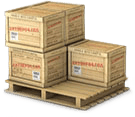One of the many surprising facts that we come across quite regularly is peoples lack of knowledge regarding the EC. EC stands for European Community. The EU (European Union), EEA (European Economic Area) and EEC (European Economic Community) are all names for the same thing. The EC is currently made up of 28 countries or members. They are;
– Austria
– Belgium
– Bulgaria
– Croatia
– Cyprus
– Czech Republic
– Denmark
– Estonia
– Finland
– France
– Germany
– Greece
– Hungary
– Ireland
– Italy
– Latvia
– Lithuania
– Luxembourg
– Malta
– Netherlands
– Poland
– Portugal
– Romania
– Slovakia
– Slovenia
– Spain
– Sweden
– UK
If you are shipping to any of these countries from the UK then there will be VAT on the shipping costs. For UK VAT registered customers you can then claim this VAT back on your quarterly return.
If your EC customer is VAT registered and can provide you with a valid EU VAT registration number you do not charge VAT on the sale.
However if your buyer is not VAT registered, or you cannot obtain their VAT number, then as the seller you must charge the UK rate of VAT.
If you are selling goods of European origin to;
– Iceland
– Liechtenstein
– Norway
– Switzerland
Then as EFTA (European Free Trade Agreement) members they are permitted to receive the goods at a preferential rate of import duty. Depending on the value of the goods you, as the shipper, are required to make a declaration to this effect. You simply need to add the following declaration on your Customs/Commercial invoice;
“The exporter of the products covered by this document declares that, except where otherwise clearly indicated, these products are of **** preferential origin”
Entering in the European origin of the goods as asterisked.
If any of the goods are not of European origin then these need to be clearly marked on your invoice.
Customs will require 5 original invoices, each indivdually signed, named and dated in BLUE.
Do this; your customer may not thank you for doing it but will certainly complain if you don’t.



